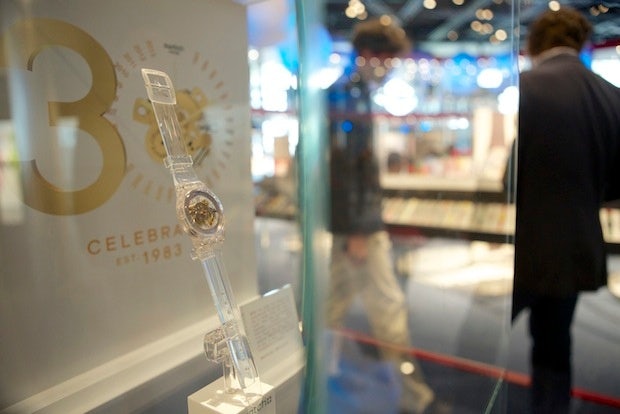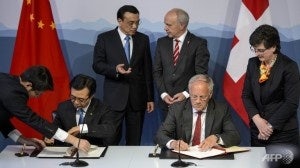Steep Drop In Tariffs Intended To Spur Purchases On Mainland#

A display by Swiss company Swatch at this year's Baselworld watch and jewelry fair. (Baselworld)
As Switzerland and China prepare to sign a landmark free trade agreement in July, the world-renowned Swiss watch industry has played a critical role in negotiations.
On Monday, the Federation of the Swiss Watch Industry (FH) announced that industry and government leaders signed a watch memorandum which spelled out China's plans to cut tariffs on Swiss watches by 60 percent over the next decade. The agreement states that once the free trade deal is signed, Swiss watch imports will be lowered by 18 percent in the first year and 5 percent annually after that. Signatories to the memorandum will meet once a year, and include the FH, the Swiss State Secretariat for Economic Affairs, the China Horologe Association, and the Chinese Ministry of Industry and Information Technology. As negotiations currently stand, the free trade agreement will allow Switzerland to remove tariffs on almost all goods imported from China, while China will remove them from 84 percent of imported Swiss goods.

Swiss Economy Minister Johann Schneider-Ammann (R), governor of China's central bank Zhou Xiaochuan (L), Prime Minister Li Keqiang (3L), and Swiss President Ueli Maurer (3R) sign a memorandum related to the countries' free trade agreement. (AFP)
This deal is likely to give a boost to lagging watch exports from Switzerland to the mainland. Swiss watches, which are popular for official "gifting" purposes in China, saw exports to China decline 26 percent in the first three months of the year. Although there has been a general luxury slowdown this year, the steep watch decline has been particularly attributed to the government's crackdown on luxury gifting. Sales in mainland China were down 22 percent in April.
High taxes on luxury goods have been a significant factor in high prices that have driven the majority of Chinese luxury purchases out of the country. While import duties are one factor, Swiss watches over $1,560 also have a steep luxury tax of 20 percent. Yu Jianhua, China's assistant minister of commerce, said in a press conference discussing the watch memorandum that value-added and consumption taxes would remain on watches. Meanwhile, another official recently stated that some luxury goods may be reclassified as "daily necessities" and see lower taxes without discussing what these items may be.
Luxury goods play a major role in trade between China and many European nations. When President François Hollande of France recently visited China to discuss trade between the two countries, he brought with him luxury conglomerate PPR (soon to be renamed Kering) head François-Henri Pinault to announce the donation of a set of Qing dynasty bronze zodiac heads that had caused a great deal of controversy between China and France.